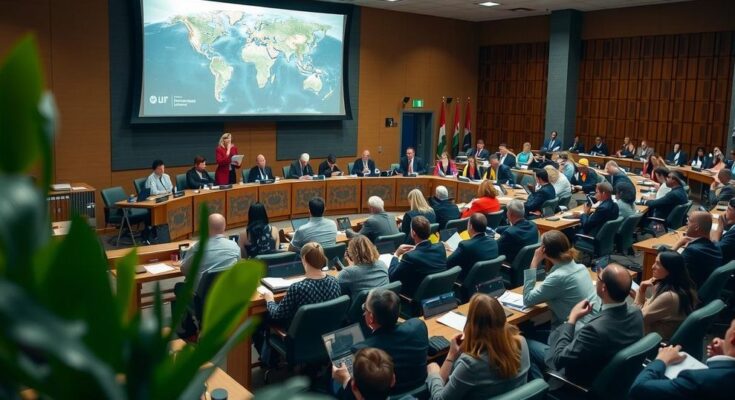UN climate talks in Baku struggle to finalize agreements, exemplifying ongoing challenges in global climate negotiations. Historical failures at COP6 and COP15 highlight deep-seated issues regarding consensus-building among nations, exacerbated by political dynamics and logistical hurdles, culminating in a pressing call for effective action in future climate discussions.
Recent climate talks in Baku faced significant challenges as negotiators struggled to forge a consensus on crucial issues, a situation not unfamiliar in the history of UN climate conferences. Since the inaugural meeting in 1995, multiple sessions have been marred by discord and outright failure, including the unprecedented suspension during COP6 in The Hague in 2000, exacerbated by the uncertainty surrounding the U.S. presidential election. The consequential appointment of President George W. Bush, a known climate skeptic, heavily influenced subsequent discussions, particularly concerning the Kyoto Protocol.
In a more prominent failure, the 2009 Copenhagen conference, or COP15, was characterized by high expectations due to President Barack Obama’s election, which reignited hopes for substantial climate action. However, the summit devolved into disappointment as core negotiations faltered, driven partly by the absence of foundational agreements on binding emissions targets, particularly with China. The aftermath left the Copenhagen Accord, which merely acknowledged climate realities without establishing concrete emissions reductions. Reports surfaced of logistical problems contributing to the disarray, including shortages of food and drink for exhausted delegates.
More recently, COP16 on biodiversity in Cali, Colombia, similarly dissolved without critical commitments to tackle ecological degradation, highlighting an ongoing trend of ineffectiveness in the conference processes. The inability to reach a quorum revealed stark challenges within the negotiation frameworks, prompting Colombia’s call for renewed discussions in early 2025, underscoring the urgent need for collective action in addressing both climate change and biodiversity loss.
The history of UN climate conferences is marked by both anticipation and disappointment. While addressing global climate issues, these events often highlight a lack of consensus among nations. The conferences aim to bring countries together to negotiate and establish agreements that are intended to mitigate climate change and promote environmental protection. Events like COP6 and COP15 serve as critical examples of how political landscapes can heavily influence negotiations, revealing the complexities and challenges in reaching a global agreement on climate action. Such gatherings continue to provoke discussions about their efficacy and the need for more robust frameworks to facilitate meaningful outcomes.
In summary, the challenges faced at UN climate conferences, particularly in Baku, are reflective of a broader pattern of negotiation failures in global climate diplomacy. Historical instances such as COP6 and COP15 demonstrate how political dynamics and logistical shortcomings can undermine efforts to achieve consensus. As the world grapples with climate change and biodiversity loss, the need for effective and inclusive negotiation processes becomes imperative to achieve meaningful environmental progress.
Original Source: www.france24.com




